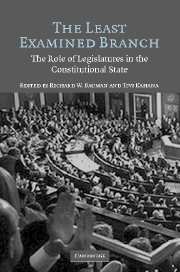Book contents
- Frontmatter
- Contents
- Foreword: Legislatures in the Constitutional State by Amy Gutmann
- Contributors
- New Ways of Looking at Old Institutions
- PART ONE LEGISLATURES AND DEMOCRATIC THEORY
- PART TWO LEGISLATING AND DELIBERATING IN THE DEMOCRATIC LEGISLATURE
- PART THREE CONSTITUTION MAKING BY LEGISLATURES: THE EXPLICIT VERSION
- 9 Legislatures as Constituent Assemblies
- 10 Legislatures and the Phases and Components of Constitutionalism
- 11 Legislatures and Constitutional Agnosticism
- 12 Constitutional Amendments and the Constitutional Common Law
- PART FOUR CONSTITUTION MAKING BY LEGISLATURES: THE IMPLICIT VERSION
- PART FIVE CONSTITUTIONAL INTERPRETATION AND APPLICATION BY THE LEGISLATURE
- PART SIX IS LEGISLATIVE CONSTITUTIONALISM POSSIBLE?
- PART SEVEN THE LEGISLATURE IN DIALOGUE: DOMESTIC AND INTERNATIONAL CONTEXTS
- Index
9 - Legislatures as Constituent Assemblies
Published online by Cambridge University Press: 06 August 2009
- Frontmatter
- Contents
- Foreword: Legislatures in the Constitutional State by Amy Gutmann
- Contributors
- New Ways of Looking at Old Institutions
- PART ONE LEGISLATURES AND DEMOCRATIC THEORY
- PART TWO LEGISLATING AND DELIBERATING IN THE DEMOCRATIC LEGISLATURE
- PART THREE CONSTITUTION MAKING BY LEGISLATURES: THE EXPLICIT VERSION
- 9 Legislatures as Constituent Assemblies
- 10 Legislatures and the Phases and Components of Constitutionalism
- 11 Legislatures and Constitutional Agnosticism
- 12 Constitutional Amendments and the Constitutional Common Law
- PART FOUR CONSTITUTION MAKING BY LEGISLATURES: THE IMPLICIT VERSION
- PART FIVE CONSTITUTIONAL INTERPRETATION AND APPLICATION BY THE LEGISLATURE
- PART SIX IS LEGISLATIVE CONSTITUTIONALISM POSSIBLE?
- PART SEVEN THE LEGISLATURE IN DIALOGUE: DOMESTIC AND INTERNATIONAL CONTEXTS
- Index
Summary
Constitutions regulate legislatures, and legislatures sometimes create constitutions. Does it follow that in such cases, legislatures engage in acts of self-binding? Or that they use the constitutions to bind others, to enhance their own freedom of action? Although neither of these simplistic propositions is adequate, each of them captures an aspect of the relation between the institution of the legislature and the text of the constitution.
The idea of viewing constitutions as acts of self-binding is one for which I have to take some responsibility. For various reasons, I have come to be skeptical of its normative and explanatory value. For one thing, the “binding” effect of constitutions is much less constraining than in such paradigm cases of individual self-binding as saving your money in a scheme under which you cannot take it out before Christmas. For another, the “self” that is supposed to bind “itself” is much more elusive in the collective than in the individual case. Concerning the second point, the idea of self-binding makes somewhat more sense when the constitution is written by the legislature than when it is the work of a special convention. A legislature that writes the ground rules under which future legislatures will operate does at least have the capacity to bind “itself,” in a loose sense of that term. By contrast, a convention that is convened for the sole purpose of writing the constitution and that is disbanded once that task is done, has no enduring “self” to bind.
- Type
- Chapter
- Information
- The Least Examined BranchThe Role of Legislatures in the Constitutional State, pp. 181 - 197Publisher: Cambridge University PressPrint publication year: 2006
- 14
- Cited by



